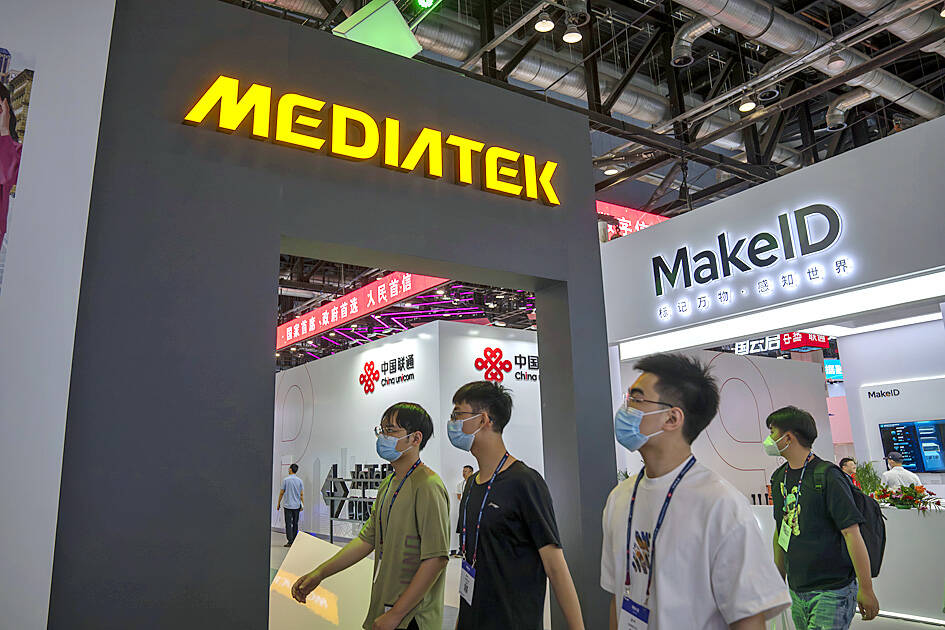MediaTek Inc (聯發科), the largest chip designer in Taiwan, yesterday denied a local media report that the company was partnering with Google to develop an artificial intelligence (AI) server chip and had received large orders from the US tech giant.
The company said in a regulatory filing that the report by the Chinese-language Economic Daily News was false and had been published on the basis of speculative information that had not been verified.
MediaTek said a false report such as the one in question could have an adverse effect on the company and investors, adding that it would resort to legal means to protect its interests if necessary.

Photo: AP
The report also said that MediaTek would collaborate with Taiwan Semiconductor Manufacturing Co (TSMC,台積電), the world’s largest contract chipmaker, to produce the AI server chips using its advanced 5-nanometer processes.
Citing industrial sources, the report said that as part of the partnership with Google, MediaTek would provide serializer/deserializer solutions to Google, which would help the US company enhance its tensor processing unit efforts to make the newest chips used in AI servers.
MediaTek is collaborating with other firms in AI development.
On May 30, it announced that it had partnered with California-based Nvidia Corp to develop technology for in-vehicle infotainment systems, with MediaTek CEO Rick Tsai (蔡力行) telling a news conference that the company would launch the automobile-related products in 2025.
By tapping into Nvidia’s core expertise in AI, the cloud, graphics technology and the software ecosystem, along with its advanced driver assistance systems, MediaTek would bolster the capabilities of its Dimensity Auto platform, the company has said.
Amid global inventory adjustments, MediaTek posted NT$16.87 billion (US$547.8 million) in net profit in the first quarter of this year, the lowest figure in nine quarters and down 8.7 percent from a year earlier, with earnings per share plummeting to NT$10.64 from NT$21.02.
The company’s consolidated sales last month decreased 39.38 percent to NT$31.57 billion from a year earlier, but the figure was up 11.35 percent from a month earlier.
During the April-to-May period, MediaTek’s aggregate consolidated sales stood at NT$59.92 billion.
Analysts have said the company needs to generate at least another NT$31.88 billion to reach its second-quarter target of NT$91.8 billion to NT$99.5 billion, which it announced at an investors’ conference in April.

Vincent Wei led fellow Singaporean farmers around an empty Malaysian plot, laying out plans for a greenhouse and rows of leafy vegetables. What he pitched was not just space for crops, but a lifeline for growers struggling to make ends meet in a city-state with high prices and little vacant land. The future agriculture hub is part of a joint special economic zone launched last year by the two neighbors, expected to cost US$123 million and produce 10,000 tonnes of fresh produce annually. It is attracting Singaporean farmers with promises of cheaper land, labor and energy just over the border.

US actor Matthew McConaughey has filed recordings of his image and voice with US patent authorities to protect them from unauthorized usage by artificial intelligence (AI) platforms, a representative said earlier this week. Several video clips and audio recordings were registered by the commercial arm of the Just Keep Livin’ Foundation, a non-profit created by the Oscar-winning actor and his wife, Camila, according to the US Patent and Trademark Office database. Many artists are increasingly concerned about the uncontrolled use of their image via generative AI since the rollout of ChatGPT and other AI-powered tools. Several US states have adopted

A proposed billionaires’ tax in California has ignited a political uproar in Silicon Valley, with tech titans threatening to leave the state while California Governor Gavin Newsom of the Democratic Party maneuvers to defeat a levy that he fears would lead to an exodus of wealth. A technology mecca, California has more billionaires than any other US state — a few hundred, by some estimates. About half its personal income tax revenue, a financial backbone in the nearly US$350 billion budget, comes from the top 1 percent of earners. A large healthcare union is attempting to place a proposal before

KEEPING UP: The acquisition of a cleanroom in Taiwan would enable Micron to increase production in a market where demand continues to outpace supply, a Micron official said Micron Technology Inc has signed a letter of intent to buy a fabrication site in Taiwan from Powerchip Semiconductor Manufacturing Corp (力積電) for US$1.8 billion to expand its production of memory chips. Micron would take control of the P5 site in Miaoli County’s Tongluo Township (銅鑼) and plans to ramp up DRAM production in phases after the transaction closes in the second quarter, the company said in a statement on Saturday. The acquisition includes an existing 12 inch fab cleanroom of 27,871m2 and would further position Micron to address growing global demand for memory solutions, the company said. Micron expects the transaction to